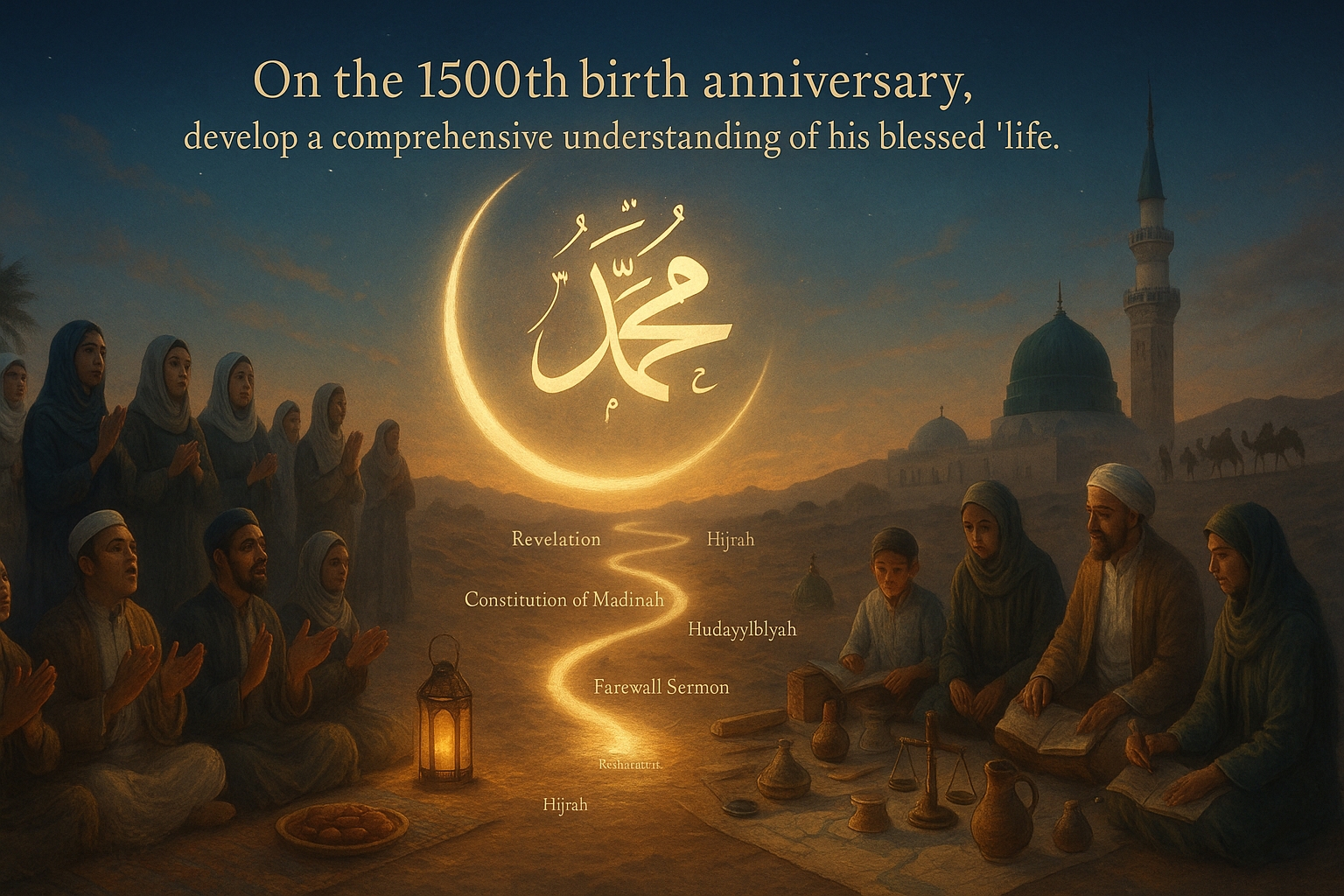The Noble Messenger: Our Model and Guide
Developing Just LeadershipZafar Bangash
Rabi' al-Awwal 12, 1439 2017-12-01
Opinion
by Zafar Bangash (Opinion, Crescent International Vol. 46, No. 10, Rabi' al-Awwal, 1439)
The Qur’an is not the biography of the noble Messenger (pbuh) but it contains many beautiful ayat highlighting his lofty character and personality. He is not only a “mercy to all the worlds” (21:107), Allah (swt) also reminds us that in the noble Messenger, “you have the most beautiful example to follow” (33:21). In another ayah, the Qur’an states, “Say [O Prophet to the people], ‘If you love Allah, follow me and Allah will love you [even more]’” (3:31).
He came into this world an orphan (his father had passed away before he was born), and lost his mother as well when barely six years old. These early childhood trials and tribulations increased when Allah (swt) chose him to be the recipient of the last and final message to all humanity. When the message was publicly proclaimed, it aroused great hostility from the Makkan power elites who saw in the message of tawhid (Oneness of Allah) a direct challenge to their vested interests. These were intimately linked to the multiplicity of deities in the Ka‘bah.
The mushriks’ hostility took numerous forms. Initially, it evoked ridicule. When that failed to subvert the divine message, the Makkan power factions resorted to oppression and torture leading to the death of some of his companions. Many others were forced into exile. The noble Messenger (pbuh) and a small group of followers continued to endure oppression in Makkah until Allah (swt) opened an opportunity in Yathrib (later to be renamed Madinah al-Nabi, or Madinah for short). While the leading figures of Madinah invited the noble Messenger (pbuh) to relocate there, the Makkan elite plotted to kill him. But Allah (swt) protected His beloved Messenger from the plots of his enemies. Upon arrival in Madinah, the noble Messenger (pbuh) established the Islamic State, the first of its kind in human history. This has important implications for Muslims and how they organize their collective lives.
While the noble Messenger (pbuh) was forced to leave the city of his birth, the Makkan mushriks did not let him live in peace in Madinah either. The mushriks waged many battles against him. In most encounters, the small but determined group of Muslims overpowered their enemies, establishing new norms of struggle for truth and justice. The battles ultimately resulted in the liberation of Makkah from the clutches of the mushriks.
It was at this point that his mercy came into full force. Had he wanted, he could have exacted revenge from those who had not only driven him and his companions from their homes in Makkah but also plotted to kill him. Far from exacting revenge, he forgave them.
Who was Muhammad (pbuh)? He was honest and upright; even his enemies could not deny his integrity and honesty. He was kind and gentle and had an extremely pleasant personality. People longed to be in his company. Even though he spoke only words of wisdom, he was extremely economical with them. While he could have had all the riches in the world, he chose to live a frugal existence, seldom eating a belly full. He smiled readily and forgave easily.
These were his qualities at the personal level. At the broader societal level, he established the Islamic State. He entered into treaties with other tribes as well as heads of state establishing a pattern of conduct that guides Muslims in all situations. When Muslims followed his example, they were successful; when they abandoned his Sunnah (life example) and Sirah (life history), they declined, falling to the depths of deprivation. That is why Allah (swt) commands Muslims, “Whatever the Messenger gives you, take it and whatever he prohibits, refrain from it” (59:07).
As the last and final Messenger (pbuh), he set an example in every field of human endeavor: social, political, economic, and spiritual. He showed how statecraft should be conducted without losing the enduring qualities of kindness and fairness. He demonstrated exemplary qualities of leadership both during times of war and peace. He sought conciliation over conflict and mercy over revenge.
“[He has sent] an apostle who conveys unto you Allah’s clear messages so that He might lead those who have made a firm commitment [to Allah] and do righteous deeds out of the depths of darkness into the light” (65:11). During his 23-year prophetic mission, he transformed the jahili society of Arabia and its savage people into the most upright human beings on earth.
If Muslims follow his example with sincerity, the world will be at their feet. Since most have abandoned the Messenger (pbuh), Allah (swt) has abandoned them.
Zafar Bangash is Director of the Institute of Contemporary Islamic Thought (ICIT).



